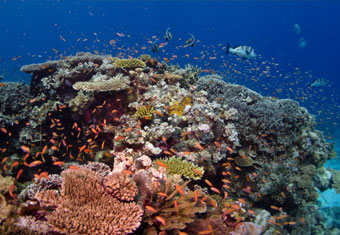

Abstract
Climate change is a fundamental challenge for how we conserve and manage biodiversity. There is an urgent need for climate adaptation strategies that can protect ecosystems from the impacts of a changing climate against a background of existing human pressures. My research focuses on managing the impacts of climate change in the oceans, specifically on coral reefs. The cumulative impacts of climate change and human pressure, primarily overfishing, threaten the biodiversity and ecosystem services provided by coral reefs. Ecosystem-based management tools such as marine reserves can reduce human pressures locally, but mounting evidence suggests that marine reserves cannot prevent wholesale losses in the face of global climate change. This calls for new approaches to prioritize coral reefs for targeted conservation, such as strategically establishing marine reserves in natural climate refugia. In collaboration with the University of North Carolina at Chapel Hill (UNC), the World Wildlife Fund (WWF), the Wildlife Conservation Society (WCS), and the National Oceanographic and Atmospheric Administration (NOAA), this project will identify coral reefs for strategic conservation action by developing the first large-scale, genus-level database of coral communities from the Indian and Pacific Oceans. My research will apply biodiversity-ecosystem functioning theory to identify novel ‘hot spots’ of coral functional diversity and use existing climate data to predict the distribution of current and future climate ‘cool spots’. Finding conservation priorities for coral reefs in the real warming world can provide a data-driven framework to guide climate change adaptation strategies and policy for U.S. and Indo-Pacific coral reefs. One of the key objectives of this project is also to build new partnerships between coral reef scientists, managers, decision-makers and local stakeholders to collaboratively develop this approach and successfully implement it to support coral reef conservation in a changing climate.
